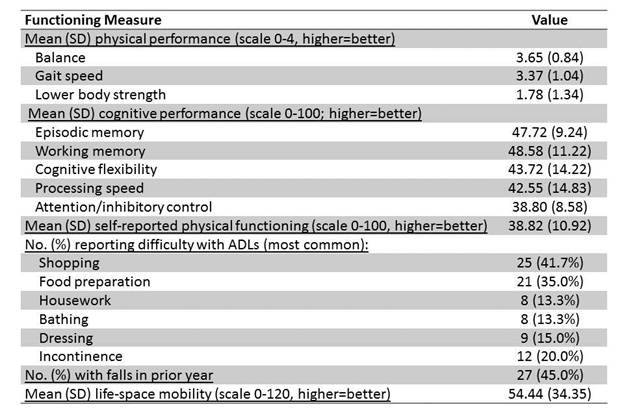Session Information
Session Type: ACR Poster Session A
Session Time: 9:00AM-11:00AM
Background/Purpose: Systemic lupus erythematosus (SLE) is a chronic, complex disease with multiple comorbid conditions and non-disease-specific manifestations. Consequently, the impact of SLE on both physical and cognitive function may be analogous to what is seen in the general geriatric population. We used a multidomain functional assessment, commonly performed in geriatric patients but novel among SLE patients, to better understand the magnitude of the functional impairment in this population.
Methods: We recruited 60 adult (≥20 years old) SLE patients from an ongoing cohort study of Atlanta-area SLE patients for an in-person visit (10/16-4/17), in which we evaluated physical and cognitive function in several domains shown to be associated with poor outcomes in geriatric populations: physical performance (by the Short Physical Performance Battery; range on balance, gait speed, and lower body strength scores, 0-4; higher scores = better performance); cognitive performance (by NIH Toolbox measures of five fluid cognition domains; reported as adjusted t-scores); and self-reported measures including physical functioning (reported as t-scores), activities of daily living (ADLs), falls, and life-space mobility, which measures how far, how often, and how much help is needed as respondents move through their community (scale 0-120; higher scores = greater community mobility).
Results: Balance and gait speed scores were high, while mean lower body strength scores were low (Table). Cognitive performance was close to average (score=50) in the domains of episodic and working memory, but mean scores for cognitive flexibility, processing speed, and attention/inhibitory control were ~1 SD below average for healthy individuals of the same age, sex, race, ethnicity, and education level. Patients reported independence in most basic ADLs but dependence in several instrumental ADLs. Nearly half (45.0%) of patients reported falling in the prior year, and only 40.0% reported unlimited ability to travel without the help of another person. Overall, scores did not differ substantially by age, although older patients had slightly lower self-reported physical functioning and higher cognitive performance scores than younger patients in general.

Conclusion: SLE patients of all ages report a substantial burden of functional impairment across multiple domains, similar to that among geriatric patients. Because impairment seems to be relatively independent of age in SLE and because greater levels of function may lead to better clinical and patient-centered outcomes, such as the ability to live independently, the value of functional assessment in the setting of SLE should be further explored. Further research could help inform potential interventions to improve or prevent further declines in functioning in this population.
To cite this abstract in AMA style:
Plantinga L, Tift B, Bowling CB, Dunlop-Thomas CM, Lim SS, Drenkard C. Multidomain Functional Assessment in a Cohort of Patients with Systemic Lupus Erythematosus: A Pilot Study [abstract]. Arthritis Rheumatol. 2017; 69 (suppl 10). https://acrabstracts.org/abstract/multidomain-functional-assessment-in-a-cohort-of-patients-with-systemic-lupus-erythematosus-a-pilot-study/. Accessed .« Back to 2017 ACR/ARHP Annual Meeting
ACR Meeting Abstracts - https://acrabstracts.org/abstract/multidomain-functional-assessment-in-a-cohort-of-patients-with-systemic-lupus-erythematosus-a-pilot-study/
